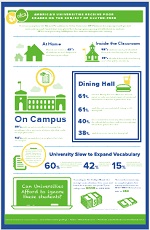National Foundation for Celiac Awareness Reports: Students Give Colleges and Universities Poor Grades on Gluten-Free
| 5/2/2013 |
|
The settlement, which required Lesley University to expand their meal plan offerings to include options suitable for students with celiac disease and other food allergies, also stated that food allergies may constitute a disability under the Americans with Disabilities Act (ADA). Despite this landmark ruling, a recent NFCA survey revealed that 61 percent of gluten-free college students believe that their Dining Services Director or staff does not have sufficient knowledge about the gluten-free diet. In addition, 60 percent of gluten-free students report being ‘glutened’ or becoming sick from eating at a dining hall or foodservice establishment on campus. “These statistics illustrate the overwhelming lack of knowledge in our secondary educational system when it comes to the needs of the gluten-free community,” says Alice Bast, founder and president of NFCA. “To students with celiac disease, gluten-free isn’t a lifestyle choice, it’s a necessity. It’s time that our colleges and universities paid equal attention to the nutritional needs and food safety concerns of this growing population.” According to the NFCA, an estimated one percent of Americans have celiac disease and an estimated six percent of Americans have gluten sensitivity, but it can take many years to get diagnosed. Among the students NFCA surveyed, nearly one in two was diagnosed while in college, emphasizing the need for support on campus. Individuals with celiac disease and gluten sensitivity require a strict, lifelong gluten-free diet. The transition can be a confusing and isolating process, and when compounded with a dining services staff that is either resistant or ill-prepared to accommodate that need, students with gluten-related disorders often have few or no dining options on campus. “Celiac disease is known as a medical issue, but it’s also an issue of community,” says Priyanka Chugh, a senior at New York University. “I know most universities, in addition to being paragons of academia, seek to create strong and inclusive communities. Providing wide-spread and safe gluten-free options would greatly benefit students requiring a gluten-free diet.” “We know that Dining Services teams work incredibly hard to provide nutritious food for their students,” Bast continues. “Our goal at NFCA is to bring light to this problem and help colleges and universities get the knowledge and tools to meet this overlooked medical need.” National Celiac Awareness Month Educating Our Schools
Download the Infographic: America’s Universities Receive Poor Grades on the Subject of Gluten-Free
|




